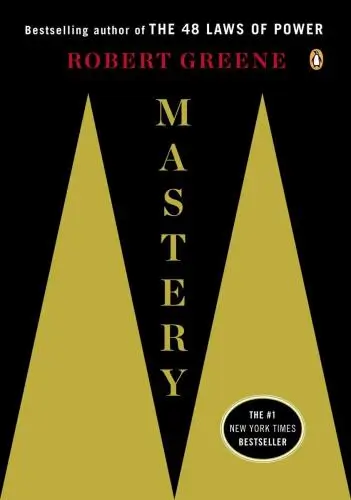Mastery
What's it about?
Mastery is a guide by Robert Greene that explores the paths of historical geniuses and modern masters to unveil the secrets of achieving greatness. Greene emphasizes the importance of embracing your unique talents and dedicating yourself fully to your craft. By studying the strategies and mindsets of legendary figures like Leonardo da Vinci and Mozart, readers can learn how to cultivate their own mastery in any field. This book is a must-read for anyone seeking to unlock their full potential and achieve unparalleled success.
About the Author
Robert Greene is a bestselling author known for his books on power dynamics, manipulation, and strategy. His most famous works include "The 48 Laws of Power" and "The Art of Seduction." Greene's writing style is blunt and provocative, offering a deep dive into the darker aspects of human behavior. He explores themes of deception, manipulation, and social dynamics, providing readers with insights on how to navigate the complexities of power in various aspects of life.
10 Key Ideas of Mastery
Discover Your Unique Calling: The Path to Mastery Begins with Deep Self-Knowledge
Identify your innate strengths and passions by reflecting on activities that deeply engage you and make time pass unnoticed.
This self-awareness is crucial because true mastery can only be achieved when you work in alignment with your natural inclinations.
By understanding what genuinely fascinates you, you can dedicate yourself fully to mastering a discipline that resonates with your core interests, leading to greater satisfaction and success.
Learn DeeperReflect on Your Joyful Activities: Spend a week noting down activities that make you lose track of time or feel deeply engaged. It could be anything from writing, drawing, solving puzzles, to engaging in debates.
Seek Feedback: Ask close friends or family members what they think you're naturally good at or what they see you doing effortlessly. Sometimes, an external perspective can reveal hidden strengths.
Experiment with Your Interests: Dedicate a month to explore different aspects of the interests you've identified. For example, if you enjoy writing, try blogging, poetry, and short story writing to see what resonates the most.
Set Small, Achievable Goals: Once you've pinpointed an area to master, set small goals that are achievable but challenging. This could mean completing a short story if you're into writing, or building a simple app if coding fascinates you.
Seek Out Mentors or Communities: Look for individuals or groups who share your passion. They can provide valuable insights, feedback, and motivation. Online forums, local clubs, or workshops are great places to start.
- Example
If you discover a deep interest in photography, start by taking daily photos with your smartphone or a camera, focusing on different styles or techniques each week. Share these with friends or on social media to get feedback and encouragement.
- Example
Should you find joy in cooking, challenge yourself to prepare a new recipe every week, focusing on cuisines from different cultures. Document the process through a blog or social media to engage with others who share your passion.
Submit to Reality: The Importance of Practical Learning and Apprenticeship
Embrace the journey of learning through practical experience and mentorship.
In the initial stages of your career, seek opportunities to apprentice under experienced masters in your field.
This hands-on approach allows you to acquire tacit knowledge that cannot be learned from books alone.
By submitting to this process, you develop the skills and discipline necessary for mastery, while also building a network of contacts that will be invaluable throughout your career.
Learn DeeperIdentify potential mentors in your field: Start by researching professionals whose work you admire and who have a track record of contributing to their field. Reach out to them with specific questions or requests for guidance, showing your genuine interest and commitment.
Seek apprenticeship opportunities: Look for internships, volunteer positions, or entry-level roles that place you under the tutelage of experienced professionals. Be open about your eagerness to learn and take on tasks that allow you to observe and practice under their guidance.
Engage in continuous learning: Beyond formal apprenticeships, commit to learning every day. This could mean reading industry-related books, attending workshops, or taking online courses that enhance your practical skills.
Document your learning journey: Keep a journal or blog about what you're learning. This not only helps solidify your new knowledge but also showcases your dedication and progress to potential mentors or employers.
Network actively within your field: Attend industry meetups, conferences, and seminars. Engaging with a community of like-minded individuals can provide additional learning opportunities and connections to potential mentors.
- Example
A graphic designer early in their career might volunteer to assist a more experienced designer with a large project, gaining hands-on experience with design software and client interactions.
- Example
An aspiring chef could seek an apprenticeship in a restaurant kitchen, where they can learn culinary techniques directly from a seasoned chef while also understanding the dynamics of a professional kitchen.
Absorb the Master's Power: Learning Through Direct Observation
Learn by closely observing the techniques, strategies, and attitudes of accomplished masters in your field.
This involves not just listening to their advice but also studying their processes, understanding their decision-making, and emulating their practices.
This direct observation helps you internalize the nuances of their expertise, accelerating your own path to mastery by leveraging their years of experience.
Learn DeeperIdentify a Master: Start by pinpointing a master in your field whose work and achievements resonate with you. This could be someone in your immediate professional network, a well-known figure in the industry, or even authors and creators whose works are accessible to you.
Study Their Work Closely: Dive deep into the master's work. If they're an author, read their books. If they're a business leader, study their company's strategies and their personal contributions. Understand not just what they do, but how and why they do it.
Observe Their Decision-Making: Pay attention to interviews, talks, and any available case studies that reveal how they make decisions. Notice the factors they consider and how they approach problems.
Emulate Their Practices: Begin incorporating some of their techniques and strategies into your own work. This doesn't mean copying them exactly, but rather adapting their approaches to fit your unique context and goals.
Seek Direct Mentorship if Possible: While not always feasible, getting direct feedback from a master through mentorship or coaching can exponentially speed up your learning process. Even attending workshops or seminars where they are speaking can provide valuable insights.
- Example
If you're an aspiring writer, you might choose a successful author in your genre as your master. You would study their books, not just for enjoyment, but to understand their narrative structure, character development, and thematic depth. Additionally, attending their book talks or writing workshops can provide direct insights into their creative process.
- Example
For someone in the tech industry looking to excel in software development, identifying a master could mean following the work of a renowned developer or engineer who has contributed significantly to the field. You could study their code on platforms like GitHub, read their technical blogs to understand their problem-solving approaches, and apply similar methodologies to your projects.
See People as They Are: Social Intelligence in Mastery
Develop social intelligence to navigate the complex dynamics of any field or organization.
Understanding the motivations, strengths, and weaknesses of others allows you to effectively collaborate, negotiate, and lead.
This skill is essential for navigating the social challenges that often accompany the pursuit of mastery, including dealing with envy, competition, and collaboration.
By seeing people clearly, you can strategically position yourself to advance your learning and career.
Learn DeeperObserve Before Acting: Spend the first few weeks in any new environment, whether a job or social group, observing people's interactions, power dynamics, and behavior patterns. This will give you a clearer understanding of how to approach individuals and situations.
Ask Open-Ended Questions: When engaging with others, ask questions that encourage them to talk about themselves. This not only makes them feel valued but also provides you with insights into their motivations and personalities.
Practice Active Listening: Focus on what the other person is saying without planning your response while they speak. This shows respect and allows you to gather more information, which can be crucial for understanding their perspective.
Reflect on Interactions: After conversations or meetings, take a moment to reflect on what was said and the dynamics at play. Consider what you learned about the other person's motivations and how you can use this knowledge in future interactions.
Manage Your Emotions: Work on recognizing your emotional responses during interactions and learn to control them. This will help you remain objective and see people and situations more clearly.
- Example
In a new job, instead of immediately trying to prove your worth, spend time observing how your colleagues interact, who holds informal power, and how decisions are made. This can help you navigate your way more effectively within the organization.
- Example
When working on a group project, instead of assuming leadership, first ask each member what they feel their strengths are and what they enjoy doing. This approach can lead to a more harmonious and productive team dynamic, as it respects and utilizes individual strengths.
Awaken the Dimensional Mind: The Creative Active
Transition from rigid adherence to rules towards a more creative and intuitive way of thinking.
This dimensional mind is capable of making connections between seemingly unrelated ideas, leading to innovative solutions and breakthroughs.
Cultivating this mindset requires constant learning, openness to new experiences, and the courage to experiment and take risks.
This creative approach is key to achieving mastery and leaving a lasting impact in your field.
Learn DeeperDiversify Your Learning: Make it a habit to learn something new outside of your comfort zone every month. This could be a new language, a craft, or even a different genre of books than you're used to.
Practice Mind Mapping: When faced with a problem, instead of going straight for the most obvious solution, take a moment to jot down all possible solutions and their connections on paper. This visual exercise can help stimulate the dimensional mind.
Engage in Creative Play: Allocate time each week to engage in activities that have no rules or objectives, like painting, writing stream of consciousness, or improvisational acting. This can help break the pattern of rigid thinking.
Seek Feedback and Collaborate: Regularly share your ideas with others, even if they seem half-baked. Collaboration and constructive criticism can open up new perspectives and spark innovative solutions.
Embrace Failure as a Learning Tool: Instead of fearing failure, view it as a necessary step towards innovation. Each failure is a lesson that brings you closer to a breakthrough.
- Example
A software developer stuck on a coding problem decides to take a break and play the guitar, an activity they enjoy but don't do professionally. The break and shift in focus allow them to return to the problem with a fresh perspective, leading to a creative solution.
- Example
A marketing professional routinely writes poetry to explore different ways of expressing ideas. This practice helps them develop unique and compelling advertising campaigns by applying poetic techniques to narrative storytelling in marketing.
Deeper knowledge. Personal growth. Unlocked.
Unlock this book's key ideas and 15M+ more. Learn with quick, impactful summaries.
Read Full SummarySign up and read for free!
Mastery Summary: Common Questions
Experience Personalized Book Summaries, Today!
Discover a new way to gain knowledge, and save time.
Sign up for our 7-day trial now.
No Credit Card Needed

Similar Books

The Decision Book
Mikael Krogerus
This is Going to Hurt
Adam Kay
The ^AOxford Handbook of Job Loss and Job Search
Ute-Christine Klehe PhD
Job Interviews For Dummies®
Joyce Lain Kennedy
Job Interviews In A Week
Alison Straw
Handbook of Career Development
Gideon Arulmani
The Company She Keeps
Georgia Durante
The Millionaire Fastlane
MJ DeMarco
Losing My Virginity
Richard Branson
Crush It!
Gary VaynerchukTrending Summaries

Peak
Anders Ericsson
Never Split the Difference
Chris Voss
Smart Brevity
Jim VandeHei
The Psychology of Money
Morgan Housel
The First 90 Days
Michael D. Watkins
Atomic Habits
James Clear
Thinking, Fast and Slow
Daniel Kahneman
The Body Keeps the Score
Bessel van der Kolk M.D.
The Power of Regret
Daniel H. Pink
The Compound Effect
Darren HardyNew Books

Forex Trading QuickStart Guide
Troy Noonan
Comprehensive Casebook of Cognitive Therapy
Frank M. Dattilio
The White Night of St. Petersburg
Michel (Prince of Greece)
Demystifying Climate Models
Andrew Gettelman
The Hobbit
J.R.R. Tolkien
The Decision Book
Mikael Krogerus
The Decision Book: 50 Models for Strategic Thinking
Mikael Krogerus
Fichte
Johann Gottlieb Fichte
Do No Harm
Henry Marsh

